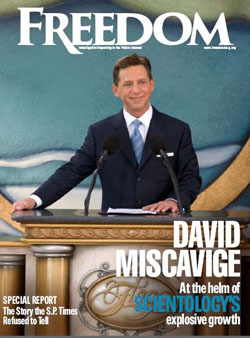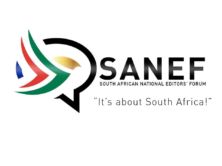
The Church of Scientology (which publishes Freedom magazine) recently tapped the skills of three veteran investigative reporters. (Credit: FreedomMag.org)
Last November, iMediaEthics drew attention to a job advertisement from the Church of Scientology seeking experienced journalists to further their mission of “Investigative Reporting in the Public Interest.”
Now it looks like that job may have been filled. Howard Kurtz at the Washington Post reports that three veteran journalists–“a Pulitzer Prize winner, a former ’60 Minutes’ producer and the former executive director of Investigative Reporters and Editors”–are being paid by the church to investigate conduct at the St. Petersburg Times.
Was the church seeking reporters to investigate the Times, which won a Pulitzer Prize in 1979 for a story on Scientology and had published another recent report critical of the church? Several commentators suggested this possibility on viewing the job advertisement last year. As StinkyJournalism wrote, recent coverage in Freedom, the church’s magazine, had appeared to focus almost exclusively on responding to and attacking critics of Scientology.
Gawker wrote,
Freedom magazine, the church’s official reporting arm, wants “experienced investigative reporters” in the Tampa Bay area – precisely where the St. Petersburg Times, a newspaper which recently published a critical series on the church, is based.
According to Kurtz, Steve Weinberg, a professor at the University of Missouri School of Journalism, was paid $5,000 to edit this report on the Times. Kurtz writes that the two journalists hired to report the piece are Russell Carollo, who won a Pulitzer Prize in 1998, and Christopher Szechenyi, an Emmy Award-winning television producer.
According to the Columbia Tribune, Carollo and Szechenyi “apparently” did respond to a Church of Scientology job advertisement. However, Weinberg was recruited by Carollo and Szechenyi–not by the Church directly, they report.
Kurtz writes at the Washington Post that the journalists promised their work on this project would be independent. They say they made sure to be paid up front so that they would not be pressured into reporting unfairly in order to be paid. They also said their agreement made sure that, in order to prevent manipulation by the church, their report would be published in full if published at all.
Despite this, Kurtz writes “the Times has refused to cooperate, saying their work will be used to fuel the church’s ongoing campaign against the Florida paper.”
St. Petersburg Times Executive Editor Neil Brown told Kurtz,
“I was surprised and disappointed that journalists who I understand to have an extensive background in investigative reporting would think it’s appropriate to ask me or our news organization to talk about that reporting while a) it’s ongoing, and b) while they’re being paid to ask these questions by the very subjects of our reporting.”
The refusal may be understandable considering the context of the Church of Scientology’s investigation. Though Carollo, Szechenyi and Weinberg say they operated independently, the facts surrounding the association create serious questions about best journalism practices and their own news judgements.
Journalism funded from any single source raises hackles, as StinkyJournalism covered in this story. Though they were paid up front, these journalists still have a financial relationship to the Church of Scientology through this project. They say their coverage hasn’t been influenced, but should the Times or the public trust that assertion?
Weinberg tells the Columbia Tribune, “Except for the fact of who was paying the money,” editing the report was “like doing a Columbia Journalism Review piece or any other media critique.” StinkyJournalism contacted him to elaborate, since the fact of who was paying the money perhaps should influence how an editor feels about doing a job. He said, “what I hoped to convey is that when I write and edit for journalism reviews, I employ rigorous standards of contextual and factual accuracy, as you would expect from a first-rate journalism review. I used the same standards while editing the Szechenyi-Carollo manuscript.”
According to Neil Brown, these aren’t the only journalists hired by the church. He tells the Washington Post, “I counted up something like six or seven journalists the church has hired to look into the St. Petersburg Times…I’ve just got two looking into the Church of Scientology.”
Brown’s comparison rings true. The Church of Scientology is certainly not a fair economic match to the Times. Michael Miner writes at the Chicago Reader,
The Scientologists hardly needed Weinberg, Carollo, and Szechenyi in order to mount a defense against the Times. They’re old hands at counterattacks. As Kurtz noted, their magazine Freedom “has repeatedly assailed” the Times. It just produced a “special report” that takes readers “inside the St. Petersburg Times.” The front-page headline: “STEAL, BRIBE AND SPY.”
We have reached out to Carollo, Szechenyi, and the Church of Scientology for comment and will update with any response.






Comments Terms and Conditions